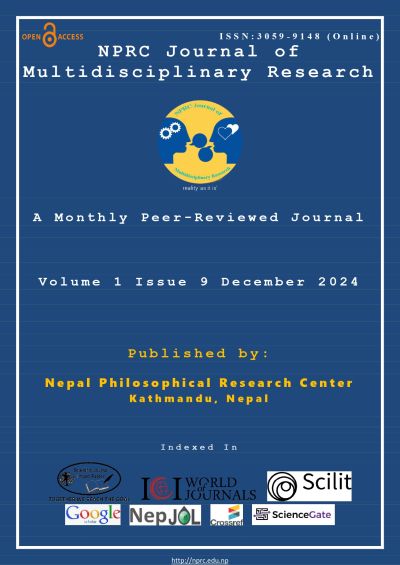Transcending Spiritual Crisis in Arun Joshi's The Last Labyrinth
DOI:
https://doi.org/10.3126/nprcjmr.v1i9.74145Keywords:
Alienation, Existence, Labyrinth, Self-realization, Spiritual CrisisAbstract
The present research paper focuses on the spiritual journey actualised by the protagonist Som Bhaskar in Arun Joshi's novel The Last Labyrinth (1981). Its main objective is to explore the why and the how of the protagonist's spiritual attainment. Perturbed by the hollowness of the society, the inner chaos and the uncertainty of life, and fretted by the insubstantial hunger and spiritual alienation, Bhaskar experiences a profound discomfort and disconnectedness from both the external world and his inner self, and therefore, he is in constant search for the meaning of life in this materialist world. He is the representative of the modern men, signifying the turbulence and trauma in life. Torn between illusion and reality, life and death, luxury and peace, he is seeking the purpose of living. Although he is a millionaire and great businessman, he searches for something that will transcend him from all the troubles and turmoil of life. He wants to taste the ambrosia of life. And it is this urge of his that makes him a 'seeker', who navigates through his labyrinthine journeys, and accosts profound questions about existence, selfhood and the existence of God. Living in the world and maintaining all sorts of strained personal and professional relations, and meeting societal expectations, Bhaskar oscillates between hopes and despair, between logic and faith, between identity and alienation, and finally he, through ontological explorations, transcends his spiritual crises and feels ultimate unity with Brahman. Peace and serenity pervade and permeate all around him, transporting him to the divine ecstasy. He achieves his spiritual equilibrium through intense self-examination. The research is done through the application of qualitative research method, analysing the dialogues, narratives and anecdotes in the text.
Downloads
Downloads
Published
How to Cite
Issue
Section
License
Copyright (c) 2024 The Author(s)

This work is licensed under a Creative Commons Attribution-NonCommercial 4.0 International License.
This license enables reusers to distribute, remix, adapt, and build upon the material in any medium or format for noncommercial purposes only, and only so long as attribution is given to the creator.





